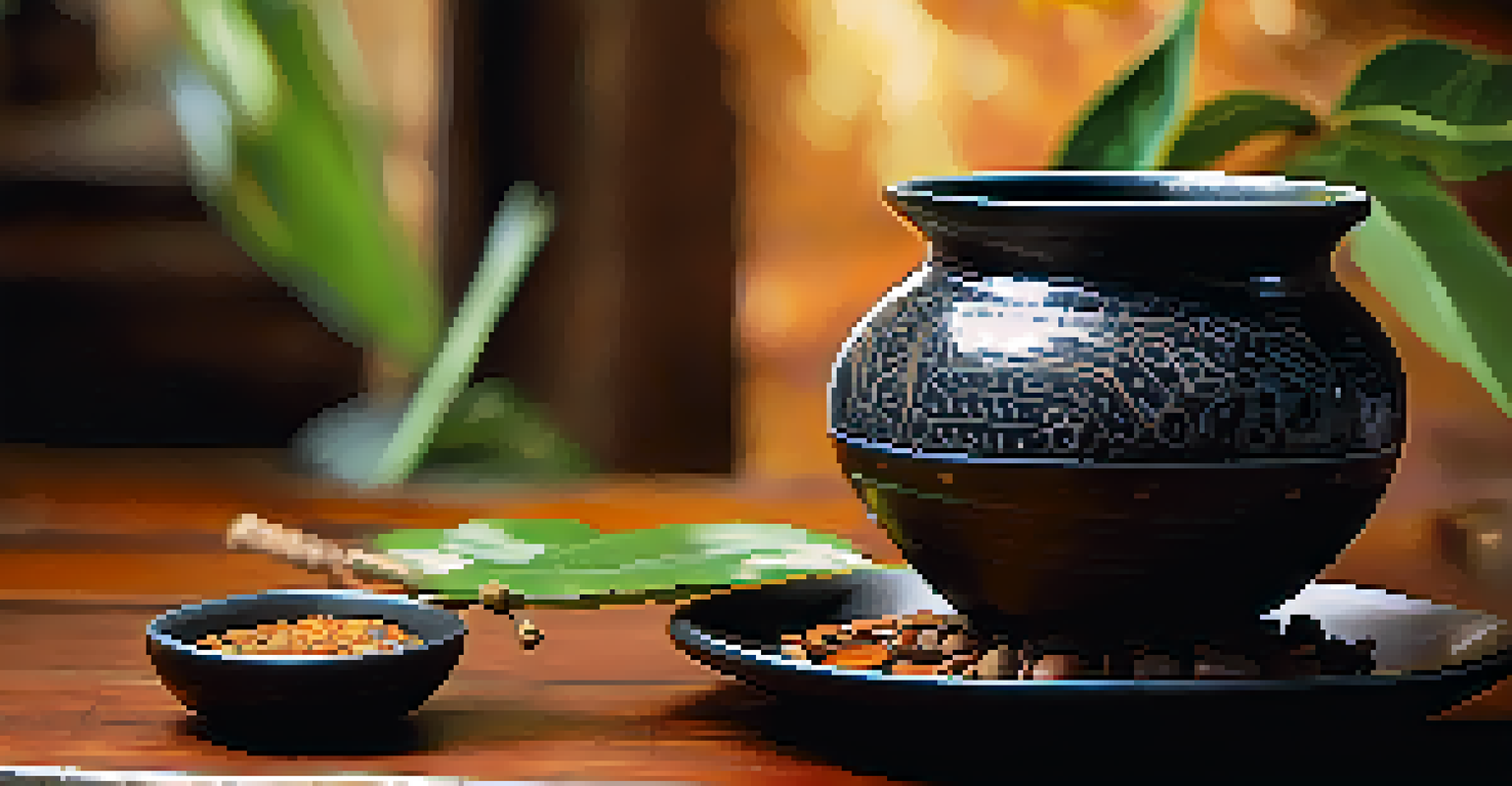Ayahuasca and PTSD: Healing Through Plant Medicine

Understanding PTSD: More Than Just a Memory
Post-Traumatic Stress Disorder, commonly known as PTSD, is often misunderstood. It goes beyond experiencing a traumatic event; it affects how individuals perceive the world and themselves. Symptoms can include flashbacks, anxiety, and emotional numbness, making daily life a challenge.
The wound is the place where the Light enters you.
For many, traditional therapies like talk therapy or medication may not provide the relief they seek. This has led some to explore alternative treatments, including plant medicines like Ayahuasca. Understanding PTSD is crucial to appreciating the potential of these alternative healing methods.
By acknowledging the complexities of PTSD, we open the door to exploring diverse healing options. This includes not only conventional methods but also the ancient practices rooted in indigenous cultures, such as those involving Ayahuasca.
What is Ayahuasca? A Brief Overview
Ayahuasca is a powerful plant medicine originating from the Amazon rainforest, made by combining two key ingredients: the Banisteriopsis caapi vine and the leaves of the Psychotria viridis shrub. This brew has been used for centuries by indigenous tribes for spiritual and healing purposes. The combination creates a potent psychoactive experience, often leading to profound insights.

Many people describe Ayahuasca ceremonies as intensive journeys into the self, where they confront past traumas, emotions, and fears. These experiences are often guided by experienced shamans who provide a safe environment. Understanding what Ayahuasca is can demystify the process for those considering it as a treatment for PTSD.
Understanding PTSD's Complexity
PTSD affects individuals beyond just memories, influencing their perception of the world and themselves.
The potential benefits of Ayahuasca are not solely physical; they also encompass emotional and spiritual healing. This holistic approach is what draws many individuals looking to address their PTSD in a more integrated way.
The Science Behind Ayahuasca and Healing
Research into the effects of Ayahuasca on mental health is still emerging, but initial studies suggest it could be beneficial for PTSD. The brew contains DMT (dimethyltryptamine), a compound that can alter perception and potentially lead to healing insights. Some studies have shown that Ayahuasca can help reduce symptoms of anxiety, depression, and PTSD.
Healing takes time, and asking for help is a courageous step.
The therapeutic power of Ayahuasca lies in its ability to facilitate deep emotional processing. Users often report experiencing a release of pent-up emotions, which can be crucial for those who have struggled with trauma. This release can be transformative, helping individuals to break free from the cycle of trauma and avoidance.
As we delve deeper into the science, it becomes clear that while Ayahuasca is not a cure-all, it offers a unique avenue for healing. It encourages introspection and emotional connection, which can be vital for those trying to overcome the shackles of PTSD.
Personal Stories: Healing Journeys with Ayahuasca
Many individuals have shared transformative experiences with Ayahuasca that changed their lives. For instance, one participant spoke of confronting childhood trauma during a ceremony, which allowed her to finally process emotions she had long buried. These personal stories highlight the potential of Ayahuasca in catalyzing healing.
Another individual described their experience of feeling a profound sense of connection to others during their journey. This sense of unity can be incredibly healing for those who feel isolated by their PTSD. Such narratives emphasize how Ayahuasca can promote emotional release and healing.
Ayahuasca's Healing Potential
Ayahuasca, a traditional plant medicine, offers a unique approach to addressing PTSD through emotional and spiritual healing.
These testimonials, while subjective, underscore the impact that Ayahuasca can have. They provide hope to those who have struggled with the debilitating effects of PTSD and encourage exploration into alternative healing methods.
Cultural Significance of Ayahuasca in Healing
Ayahuasca is deeply rooted in the traditions of various Amazonian cultures, where it is viewed as a sacred medicine. Shamans, or spiritual guides, play a pivotal role in facilitating ceremonies, using their knowledge to help participants navigate their experiences. This cultural context adds layers of meaning to the healing process.
Understanding the cultural significance of Ayahuasca is essential for those considering it for PTSD treatment. It's more than just a substance; it's part of a holistic tradition that emphasizes community, spirituality, and the interconnectedness of life. This perspective can enhance the healing experience.
By respecting and acknowledging the cultural roots of Ayahuasca, participants can engage with the medicine in a more meaningful way. This cultural connection may enhance the therapeutic effects experienced during ceremonies, offering richer insights into personal healing.
Potential Risks and Considerations
While Ayahuasca holds promise for healing PTSD, it's crucial to approach it with caution. The intense experiences can evoke powerful emotions and memories, which may not be suitable for everyone. Individuals with certain mental health conditions, such as schizophrenia, are advised to avoid it.
Additionally, the setting in which Ayahuasca is consumed plays a significant role in the experience. Ceremonies should be conducted in safe, supportive environments, ideally led by experienced shamans. Without proper guidance, the experience can become overwhelming or distressing.
Cultural Context Matters
Respecting Ayahuasca's cultural significance enhances the healing experience, emphasizing community and interconnectedness.
Being informed about potential risks and having realistic expectations is vital for anyone considering Ayahuasca for PTSD. Understanding the journey ahead can prepare individuals for both the challenges and transformative potential of this plant medicine.
Finding Support and Resources for Healing
For those interested in exploring Ayahuasca as a treatment for PTSD, finding the right resources and support is essential. This includes researching reputable retreat centers, understanding the qualifications of facilitators, and seeking recommendations from trusted sources. Careful planning can significantly impact the overall experience.
In addition to Ayahuasca, many individuals may benefit from integrating other healing modalities, such as therapy or mindfulness practices. Combining these approaches can create a robust support system that enhances overall well-being. It’s important to consider a holistic approach to healing.

Connecting with communities, either online or in-person, can also provide valuable support and insights. Sharing experiences and learning from others can empower individuals on their healing journey, reminding them that they are not alone in facing the challenges of PTSD.